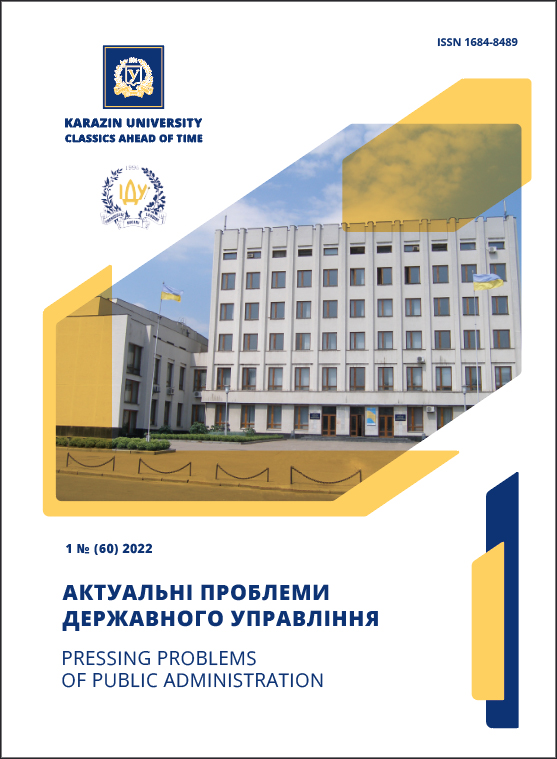MANAGEMENT OF SUBORDINATES’ ACTIONS: HOW TO ENSURE THE ACCURACY OF OFFICIAL PUNISH?
Abstract
Аnnotation. Consistent and persistent efforts of Ukraine to become a member of the
European Union require a systematic approach to further improvement of management activities in
the field of public administration. Forced or accidental mistakes of public sphere managers occur as
a result of low management qualifications, they do not provide an opportunity to bring the efficiency
of public organizations to a fundamentally new level. Among the functions of management, motivation
and punishment of subordinates are the most problematic, due to low attention to these aspects in
domestic and foreign scientific literature.
Recent research and publications analysis. Problems of improving managerial activity
are studied in the works of such leading scientists and practitioners as I. Adizes, A. Fayol, H. Ford,
V. Tarasov, O. Friedman, B. Tracy, P. Drucker, R. Blake, J. Mouton. However, many questions
regarding the effective influence of a manager on subordinates remain open to this day.
The paper objective is the analysis of complex negotiations with a subordinate during the
punishment procedure, identification of subordinates’ typical techniques to avoid punishment, offering
optimal options for the manager's response.
The paper main body. The mechanism of conducting complex negotiations between a
manager and a subordinate during the punishment procedure is analyzed. The typical methods
of subordinates to avoid punishment are determined, and the optimal options for the manager’s
response during this procedure are distinguished. It is emphasized that punishment is an integral part
of the manager’s professional competence. It was found that moral punishment should be considered
the most effective, because it acts as a prevention of administrative punishment application, while
simultaneously forming a model of subordinate behavior in accordance with corporate norms. Moral
punishment is carried out through the subordinate’s recognition of the fallacy of his actions through
internal rethinking and correction of his/her ”picture of the world”. It is accentuated that manager
should be punished for the violation, not its consequences. It is proved that management should
include the approaches of theory X and theory Y according to the views of David McGregor. It is
revealed that the punishment of a subordinate should not be accompanied by rudeness, disrespect,
humiliation, insult, accusation, revenge, etc. The sequence of stages in complex negotiations with a subordinate is substantiated, the purpose and content of each stage is determined. Negotiations with
subordinates during punishment should simultaneously solve several tasks: satisfy the interests of
the case, improve relations with team, strengthen authority of the manager. A significant difference
between the concepts of “mistake” and “misdemeanor” in the employee’s activity was determined.
The manager’s readiness to punish subordinates can be considered as part of demandingness: the
ability to demand from the subordinate a model of behavior that the manager considers correct in
relation to existing corporate norms.
Conclusions. The theoretical approaches discussed in the article require practical
implementation and consolidation as skills. For this, it is recommended: First, it is advisable for the
manager to take a critical look at the level of his management competencies development: planning,
delegation and control. It are these functions that have the greatest impact on the accuracy of tasks
performed by subordinates.
Secondly, when implementing the method of punishment described above, it is necessary to
prepare in advance for difficult negotiations with a subordinate. Perhaps this work will seem boring
to a practicing manager, but the methodology should be written down in a synopsis and learned by
heart. At first, it is better not to improvise, but to clearly act according to the algorithm.
Thirdly, no matter how rude it may seem, but in order to consolidate the skill of punishing
subordinates, the manager needs practice. It is necessary to start training on subordinates who do not
feel sorry. This category includes those who constantly violate discipline and corporate regulations,
employees with a low level of performance, insufficient responsibility, or those who should have been
fired yesterday.
Downloads
References
Adizes, I. (2019). Yak podolaty kryzu upravlinnia. Kharkiv: Ranok, Fabula [in Ukrainian].
Yevdokymov, V.O. (2019). Efektyvne pokarannia pidlehlykh yak profesiina kompetentsiia kerivnyka. Ekonomika ta derzhava, no. 3, 31–35. URL: http://ipk.edu.ua/wp-content/uploads/2020/04/zhurnal-3-2019.pdf (data zvernennia: 24.07.2022) [in Ukrainian].
Yevdokymov, V.O. (2019). Temnyi bik motyvatsii personalu na publichnii sluzhbi [The dark side of staff motivation in the public service]. Aktualni problemy derzhavnoho upravlinnia – Pressing problems of public administration, No 2 (56). URL: http://apdu.journal.kharkiv.ua/index.php/apdu/article/view/111/113 (data zvernennia: 04.07.2022) [in Ukrainian].
Pro derzhavnu sluzhbu: Zakon Ukrainy vid 10 hrud. 2015 r. No. 889-VIII. URL: https://zakon.rada.gov.ua/laws/show/889-19 (data zvernennia: 11.08.2022) [in Ukrainian].
Bizo, L., Ibrahimova, I., Kikot, O., Baran, Ye., Fedoriv, T. (2012). Rozvytok liderstva. Kyiv: Proekt “Reforma upravlinnia personalom na derzhavnii sluzhbi v Ukraini” [in Ukrainian].
Tomchuk, S.M., Tomchuk, M.I. (2018). Psykholohiia tryvohy, strakhu ta ahresii osobystosti v osvitnomu protsesi: monohrafiia. Vinnytsia: KVNZ “VANO”.
Shubalyi, O.M., Rud, N.T., Hordiichuk, A.I. and others. (2018). Upravlinnia personalom: pidruchnyk. Lutsk: IVV Lutskoho NTU.
Peter, F. Drucker. (2010). The Practice of Management. Harper Business.
Tarassov, V. (2014). Juhtimisvõitluse kunst: juhtimise ülevõtmise ja säilitamise tehnoloogiad. Smart Maakler OÜ.
Tarasovs, V. (2019). Dzīves tehnoloģija. Jumava.
Waldman, M. (1990). Up-or-Out Contracts: A Signaling Perspective. Journal of Labor Economics, 8, 230–250.

